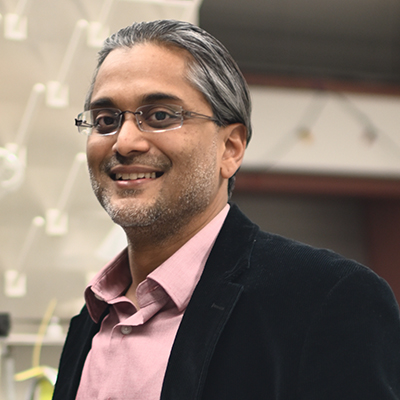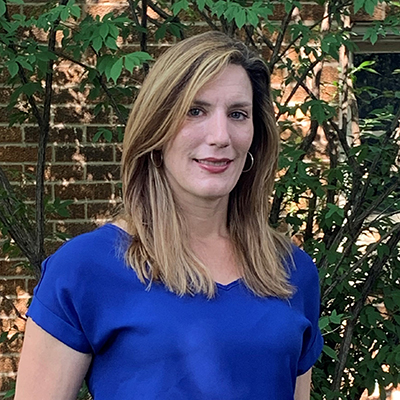 Ankur Saxena, Ph.D.
Ankur Saxena, Ph.D.
The UAB Department of Cell, Developmental, and Integrative Biology (CDIB) has launched a new article series titled Meet the Minds of CDIB, spotlighting the diverse faculty who power the department’s groundbreaking research. Through candid interviews, the series gives readers a closer look at the career paths, passions, and real-world impacts of UAB researchers shaping the future of medicine. This installment is unique because while the series typically highlights faculty, Ankur Saxena, Ph.D., associate professor, chose to spotlight Lynne Nacke, a senior staff scientist in his lab. Her journey from part-time technician to leading an exciting Alzheimer’s research project captures the spirit of mentorship, perseverance, and innovation that defines the department and shapes the future of medicine.
Nacke, who earned her bachelor’s degree in medical laboratory sciences from the University of Illinois Chicago (UIC), calls her path into science “very unconventional.” She began her career in hospital microbiology labs, with no scientific mentors to guide her. After working in both hospital and academic labs in the U.S. and abroad, she eventually joined Saxena’s lab at UIC in 2016. What began as part-time work grew into a central role. “Over the years, I went from more of a technician role, which involved helping graduate students, managing the lab, and maintaining the fish room, to a more senior role where I’m now leading our Alzheimer’s disease project. Even though I only have a bachelor’s degree, my role now has morphed into one that parallels a postdoc position. It’s mostly from hard work and experience over the years,” said Nacke.
Having moved to UAB with the lab in late 2023, Nacke now spearheads an Alzheimer’s disease project, which grew out of  Lynne Nackethe lab’s research on olfactory neurogenesis and regeneration. Saxena earned his Ph.D. in genetics & development from the University of Texas Southwestern Medical Center and completed postdoctoral training at Harvard Medical School and the California Institute of Technology. He explains the importance of Nacke’s work, “The human nose is quite unique in harboring constant neuronal regeneration throughout our lives. At the same time, loss of smell can be an early biomarker for neurodegenerative diseases such as Alzheimer’s and Parkinson’s, which is hard to reconcile with the tissue’s capacity for making new neurons and supporting cells. If we can understand how and why that neuronal turnover falters in Alzheimer’s, it could provide critical insights into neuronal diseases more broadly.”
Lynne Nackethe lab’s research on olfactory neurogenesis and regeneration. Saxena earned his Ph.D. in genetics & development from the University of Texas Southwestern Medical Center and completed postdoctoral training at Harvard Medical School and the California Institute of Technology. He explains the importance of Nacke’s work, “The human nose is quite unique in harboring constant neuronal regeneration throughout our lives. At the same time, loss of smell can be an early biomarker for neurodegenerative diseases such as Alzheimer’s and Parkinson’s, which is hard to reconcile with the tissue’s capacity for making new neurons and supporting cells. If we can understand how and why that neuronal turnover falters in Alzheimer’s, it could provide critical insights into neuronal diseases more broadly.”
For Nacke, the research is also personal. “My grandmother had Alzheimer’s disease, and that makes me even more determined to work on this project. I couldn’t help her, but maybe my research can one day help current or future patients.” Her focus is on amyloid beta 42, a protein central to Alzheimer’s pathology. “I have evidence to suggest that amyloid beta 42 is somehow affecting the number and/or function of neurons in the nose. Can we figure out what’s going on? Can we find ways to reverse, rescue, or prevent those negative impacts from happening? There’s a potential therapeutic target there.”
Nacke has co-authored numerous publications, including the lab’s most recent paper, featured this month on the cover of Stem Cell Reports’s “Neural Stem Cells” Special Issue, and was also recognized by Science Magazine for an award-winning microscopy image. Her next milestone is to publish a significant first-author paper on Alzheimer’s disease. Saxena praises her growth, “While I write the grants and have my role to play, I think it’s fair to say that on a day-to-day basis, people would miss Lynne a lot more than they would miss me. She is, in many ways, the heart and soul of the lab as it grows after our move here. Professionalism, work ethic, dedication, and passion for science aren’t necessarily teachable qualities – they’re ingrained in who you are as a person, and that’s what Lynne brings to the table.”
Both emphasize persistence and mentorship as keys to scientific success. Saxena advised, “If you’re just starting out in science in these unusually challenging times, keep in mind that things will look different by the time you graduate. Try to find mentors who won’t coddle you but will push you to grow and thus be more competitive in your future job market.” Nacke adds that networking has been equally important. “With the exception of my first research job, all my other positions came through word of mouth. Networking really helped me out, and I think it’s critical in this field.”
From her beginnings as a part-time technician to her current leadership in Alzheimer’s research, Nacke’s story reflects both the power of mentorship and the impact of determination. As Saxena put it, “She’s an inspiration, not just to young trainees, but to women in science in general, to see what’s possible now as opposed to maybe 50 or 100 years ago.”
Follow along with the Meet the Minds of CDIB series to discover more about the faculty advancing science at UAB.